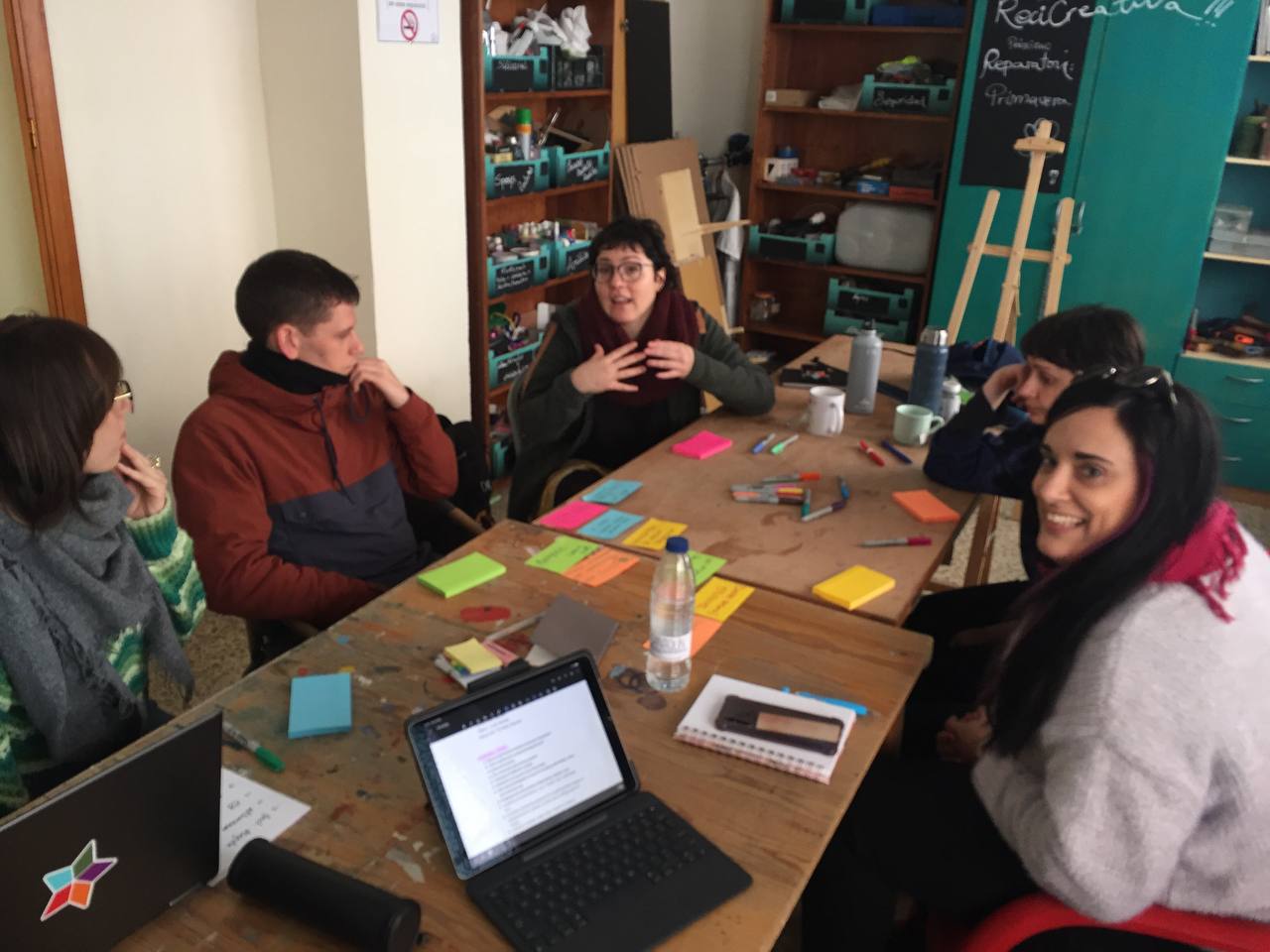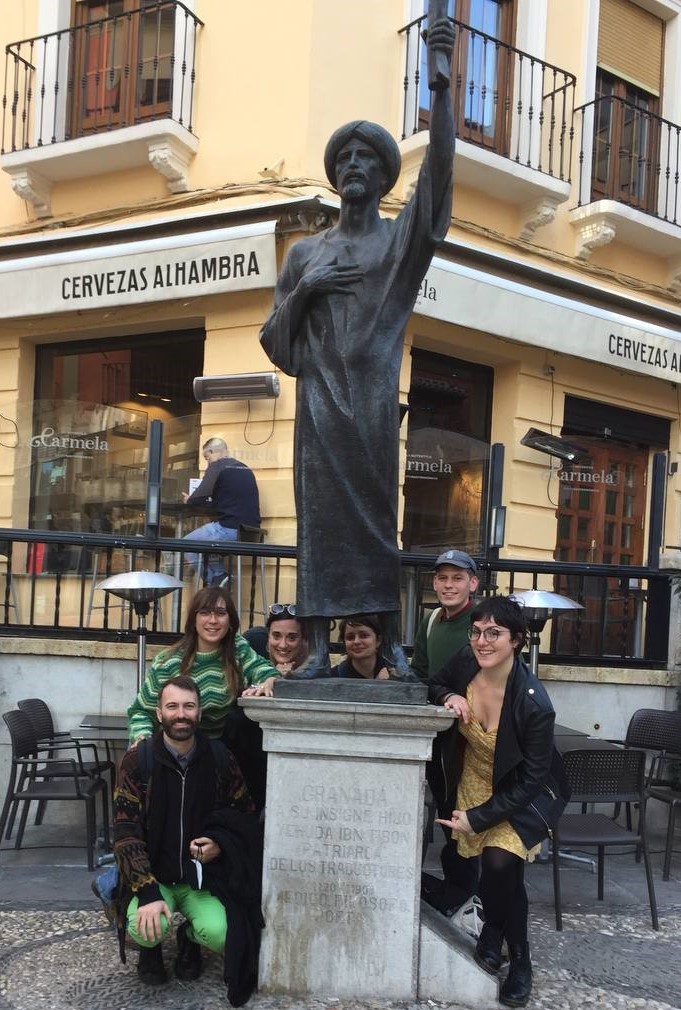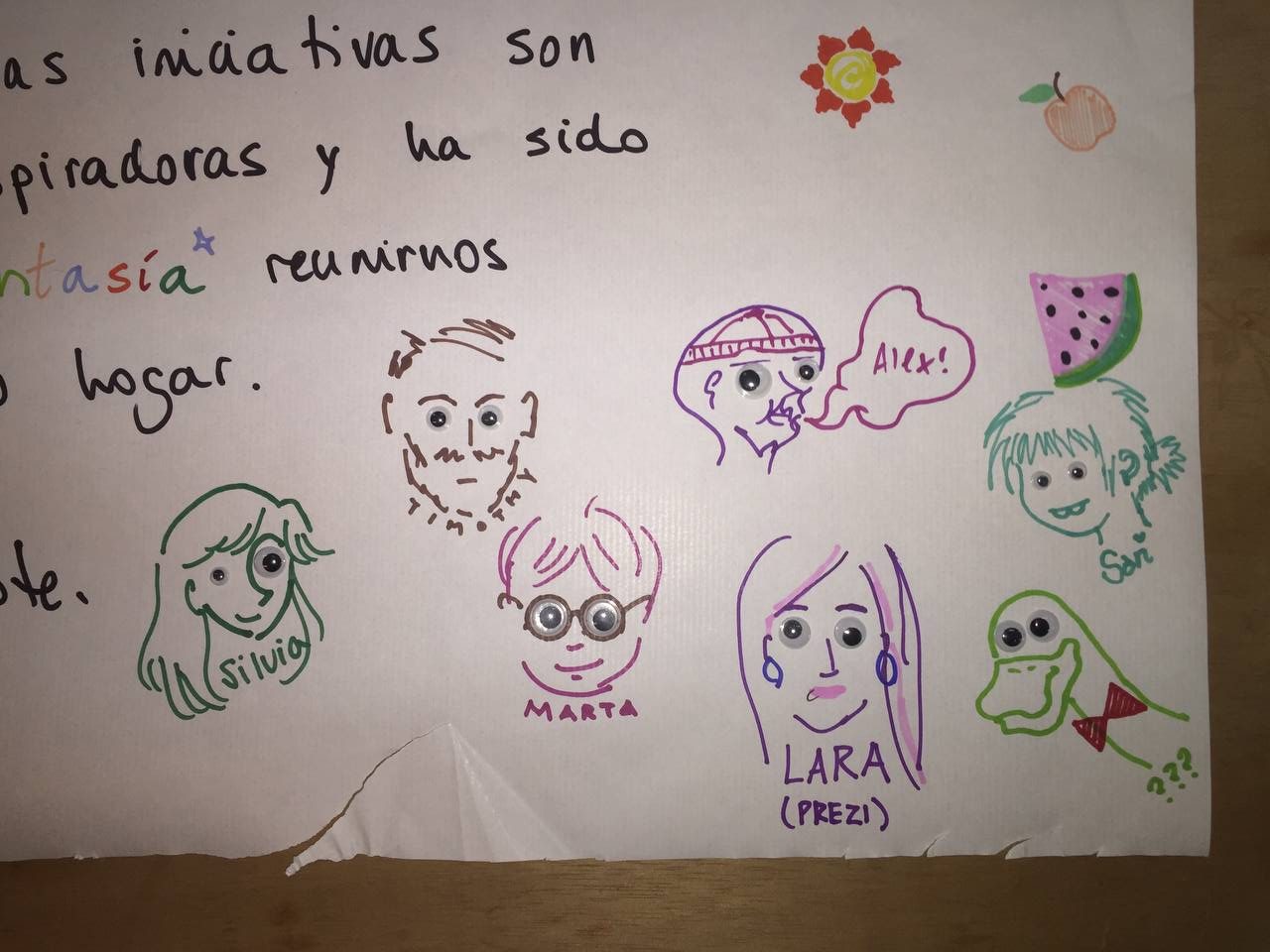Granada Extravaganza Meeting
In March 2022, the Guerrilla Translation crew spent five days in Granada, with all active members in attendance: Timothy, Silvia, Lara, Marta, Sari and Alex (the newest member, and author of this text). We travelled from far and wide, with delegations arriving from Berlin, Burgos, Seville and Valencia, and began our time together with what would come to set the tone for much of the days ahead: we went out for tapas. It was entertaining (we are translators, not mathematicians) figuring out the numerical specifics of how tapas are ordered in Granada. It seemed like something straight out of a high school maths textbook, but it turned out it wasn’t that hard and we were just a little bit tired and hungry.
Our main meetings each day were held at La Colectiva, an amazing self-managed community centre in Granada who were generous enough to lend us a room, and it was there that a lot of the weekend’s serious discussion took place. First up there was a review of the objectives set in Berlin six months previously, followed by a flurry of sharpies and post-its as we brainstormed, planned and prioritised our time together based on ideas shared in the weeks before the trip. Some of the agenda was big picture stuff, some of it related to specific projects, and some was more ongoing and administrative, but we managed, somehow, to cover it all in our time together.

We began with a retrospective of our new website campaign launch, which we all felt had gone very well, and had provided an excuse for a much-needed publicity boost, not to mention that the new server is at least 10,000 times faster than the old one. Also looming large on the first day’s agenda was the topic of Lovework, the commons-oriented pro bono translations and original content pieces which we publish on the blogs on our own website and on El Salto. We agreed that a refocus of sorts was needed, and the consensus was that Lovework should be a priority, something that works for us rather than against us which we could be deploying more thoughtfully. It’s the thing that sets us apart from other translation organisations and is baked into our DNA and our accounting system, but too often it becomes a burden, sidelined by the demands of more pressing external work or administrative duties. The outcome of our discussion was a “work smarter not harder” solution: plans are now in motion to put out periodic open calls for Lovework submissions to be translated and published on our blog under a Peer Production licence. We’re really excited for this to take shape but the specifics are still being ironed out, so keep an eye on our socials over the coming weeks for more news.
Conversation on this topic strayed into revealing territory when the motto “make it til you fake it” was inadvertently coined to describe an unfortunate (but apparently relatable) tendency to underestimate and undersell your own very advanced capabilities, coupled with the feeling that confident self-promotion can sometimes feel a little “icky” and uncomfortable, like something only allowed once you have the goods to back it up. In a world full of hucksters and window-dressers, the exact opposite is more often true, and “faking it” often comes well before, or even devoid of, any “making it”. Guerrilla Translation has been making it since day one — faking has never been in our arsenal — but we just want to acknowledge how rad our Lovework output has always been, and to share it more freely with a wider audience.

We spent our time outside meetings being taken on fascinating, meandering walking tours by Sari, a Granada native. We saw the cathedral, the steep winding streets and old houses of the Albaicín, and even stumbled upon a statue of Yehuda Ibn Tibón, the “father of translators”. As the newest member, I came to realise that our downtime in Granada was at least as important as any of our meetings. Day-to-day we organise ourselves and manage our affairs online, but as anyone who attended a Zoom quiz over the last two years can confirm, there’s a limit to what can be communicated through a rectangle on a screen. Simply hanging out, chatting, laughing and sharing space, air and food creates the glue that binds us together, and while the collective can theoretically survive without this interaction, it could never thrive. As one member put it, GT is much more than “6 freelance translators standing on each others’ shoulders, wearing a trenchcoat and pretending to be one big freelance translator”.
The weightiest discussions took place on the third day, and honed in on the most pressing long-term objective for all members: what will it mean for Guerrilla Translation to be a stable, steady and dependable source of income for all its members? To do this we needed to crunch numbers and think hard about details, and so we began, naturally, with popcorn and a movie. This led us to come up with different financial scenarios based on where we are now and where we want to be, and we spoke frankly about what individual needs would have to be met for each of us to dedicate ourselves full-time to GT. We then unfurled a very large roll of paper and sketched out diagrams based on each scenario in order to begin creating a roadmap for the cooperative’s financial future. The goal is not a new one for any of us, but we are now moving into a position where we can take this prospect more seriously, and post-Granada we are narrowing our focus even further to make it happen. One very positive, if tangential, outcome of these discussions was seeing how far the collective has come since its beginning. While we aren’t the self-congratulating sort, it bears acknowledging that Guerrilla Translation has been built from the ground up – very little seed funding, no sugar parents, no angel investors – and the fact that we were having these conversations is testament to the love and energy that has nourished it over the years. It’s a big deal for a non-hierarchical, care-centric cooperative built on feminist economics to even consider being able to provide a complete living for all its members, and even more so in an exploitative, precarious industry such as translation.

On the final day, before saying goodbye, we drew tarot cards: two for the past, two for the present, one for the future. For the past we pulled out Judgement and the King of Wands, representing decisive changes in recent months and our tenacity in overcoming past obstacles. For the present we drew The Sun and the Six of Swords; an optimistic, creative outlook and putting past difficulties behind us. Finally, for the future we drew the Seven of Wands, suggesting perseverance will be needed to protect and maintain what we have built. Time spent together galvanises our activity in GT, and these cards emphasised the importance of making the effort to strengthen the relationships that form the basis of everything we do. GT exists to provide a refuge from the cut-throat competition and perpetual uncertainty of the translation industry, as well as the capitalist system at large, and it is only by coming together like this that we can continue to construct and consolidate a world in which we are happy to live.
 Produced by Guerrilla Translation under a Peer Production License.
Produced by Guerrilla Translation under a Peer Production License.
– Article written by Alex Minshall
– Edited by Timothy McKeon
